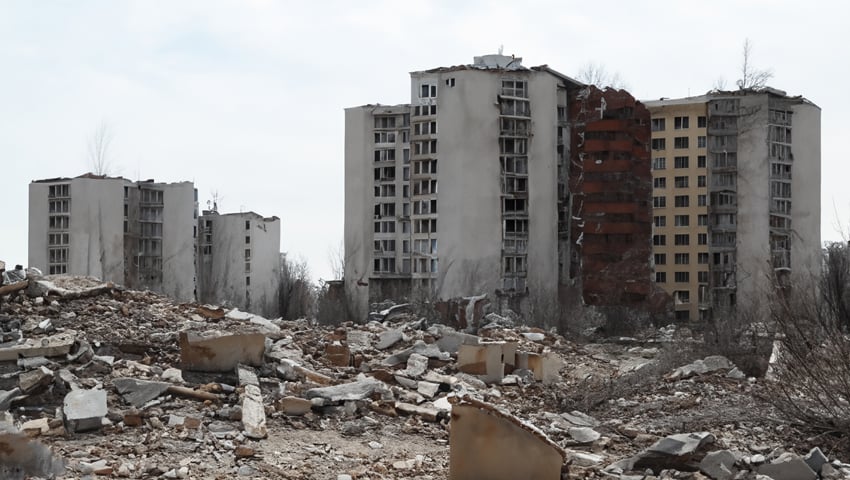“One of the most far-reaching and hard-to-count consequences of this horrible war is harm to environment and biodiversity. This includes damage to lands and soils, air, forests, lakes and seas, animals and plants.”
EARLIER this year, Mary Robinson joined President Volodymyr Zelenskyy, Greta Thunberg, Margot Wallström and others in Kyiv to assess the environmental damage caused by Russia’s illegal war on Ukraine and to launch the new High-Level Working Group on the Environmental Consequences of the War.
The first meeting of the International Working Group on the Environmental Consequences of War took place in Kyiv amidst the unfolding consequences of the attack by Russia on the Kakhovka hydroelectric dam in Ukraine.
The recently founded group released a statement following the visit affirming their support of Ukrainian authorities in their assessment of the environmental and ecological damage from the war; in holding Russia accountable; and in planning for the environmental and societal recovery of the country.
During the first meeting of the group, Chair of The Elders Mary Robinson stressed the importance of fighting impunity and the need for a robust assessment of environmental damage.
The Group strongly condemned Russia’s unprovoked, illegal and brutal war of aggression against Ukraine.
In a statement the High-Level Working Group said, “One of the most far-reaching and hard-to-count consequences of this horrible war is harm to environment and biodiversity. This includes damage to lands and soils, air, forests, lakes and seas, animals and plants.”
Ukraine’s Prosecutor General’s Office is leading national investigations into hundreds of incidents of environmental war crimes. Among them are 15 incidents of ecocide committed as part of Russia’s war of aggression against Ukraine. This includes the deliberate destruction of the dam at the Kakhovka hydroelectric power plant, which led to loss of 14.76 cubic km of freshwater loss (over 70% of the reservoir’s volume). According to Ukrainian official data 150 tons of oil leaked into the Dnipro River, thousands of hectares of lands and forests were flooded, thousands of people lost their homes, thousands of birds and animals died or are under threat.
The Group aims to support the Ukrainian authorities in their assessment of the environmental and ecological damage from the war, holding Russia accountable, and planning for the environmental and societal recovery of the country.
The Group says that it will concentrate on three main areas:
- Assessing the environmental damage from the war, and the immediate as well as medium and long-term threats to human health and the broader environment, in Ukraine, the region and globally.
- Pursuing the accountability of Russia for environmental crimes, including elaborating on ecocide charges as mass harm to the environment, and compensation for losses.
- Planning for a green recovery of the environment and rebuilding Ukraine society through transition to a green economy.
The Group will do this by providing our Ukrainian partners with high-level strategic advice, policy recommendations, and enhanced access to expertise.
Russia is destroying the Ukrainian environment every single day by continuing its brutal war. The real scale of the damage to the ecology and people of Ukraine is yet to be discovered.
The environmental damage caused by the Russian war in Ukraine must be accurately registered, every crime be determined and documented, and Russia held accountable for environmental crimes and social loss. We call on all environmental organizations as well as environmental activists to unite their efforts in combating environmental crimes that are committed in Ukraine every single day for our better future.
